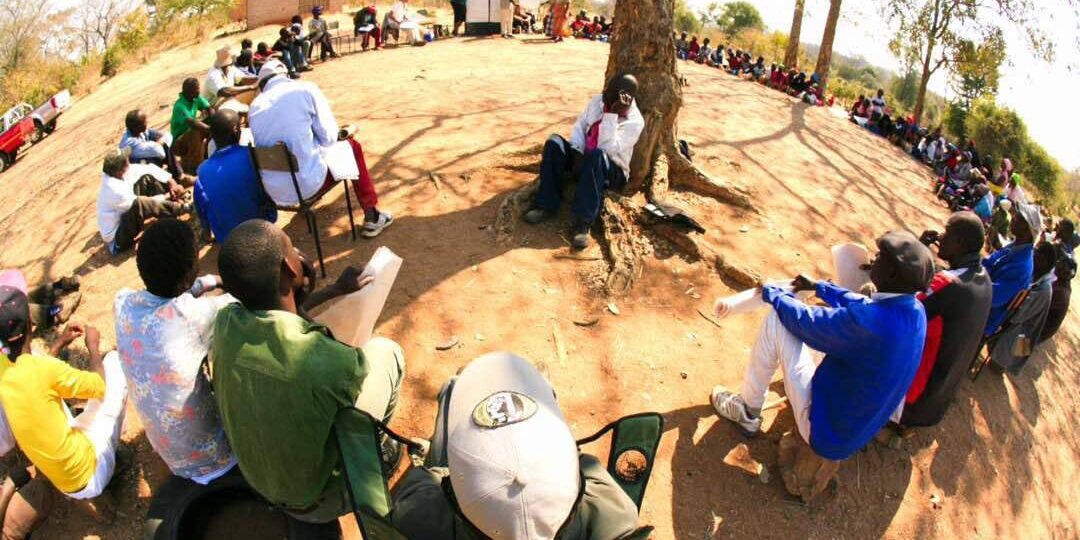Holistic Land Management Training – Chisuma, Zimbabwe

HOST ORGANIZATIONS
Igugu Trust
LOCATION
Zimbabwe
AMOUNT
$3,536
OBJECTIVE
Provide farmer-to-farmer training for the Chisuma community in order to restore local food security and regenerate land.
REACH
150 households
ABOUT THE TRAINING
While this land may look arid and beyond repair, Zimbabwe’s Chisuma community has an opportunity to implement responsible land management that can reverse vicious cycles of desertification and poverty. With specialized training, vegetation can start to come back in as little as one year and this will provide a cascade of benefits for local communities including more fresh water. This training:
- Provided specialized training in holistic management for 50 community members, reaching 150 households
- Restored/stabilized the 2,000 Ha land that the Chisuma community relies on for subsistence
- Supported in the development of community driven grazing plans, herding teams, and ecosystem monitoring teams
- Reduced human/wildlife conflict by teaching the community to build mobile livestock enclosures
- Restored soil and watershed function
- Started a seed saving bank to support local food security and revive local seed saving culture
What is Holistic Land and Livestock Management?
Holistic Land & Livestock Management uses a decision-making framework and planning processes to produce ecologically regenerative, economically viable and socially sound management of the world’s grasslands. Ranchers, pastoralists, farmers and communal farmers around the world use this methodology.
Why is Holistic Land and Livestock Management needed?
One-third of the earth's land surface is grasslands, over 70% of which are degraded. Loss of grasslands leads to climate change, floods, droughts, famine and worldwide poverty. The livelihood of over one billion people from over 100 countries is currently threatened by desertification.
Fortunately, evidence has proven that through responsible land management, ranching and farming, degraded land can be restored. Improvements in the water cycle, such as reduced evaporation and runoff, can occur within one year. The Africa Centre for Holistic Management's Dimbangombe Ranch, located in the same zone as Igugu Trust, has achieved incredible results.
How will this project help improve human/wildlife conflict?
Wildlife is a part of the heritage of the Hwange communal lands. Unfortunately, due to desertification and land degradation, the relationship between humans and wildlife has soured, in some extreme cases resulting in the death of humans and livestock. Cropland invasions and predation by wildlife have been some of the biggest contributors to human/wildlife conflict in recent years.
Through the development of mobile enclosures (or “bomas”), livestock can be kept safe from predators like lions and hyena at night, reducing human/wildlife conflict. Mobile “bomas” also play a part in restoring land.
How is this project contributing to social regeneration?
As communities work together to manage land, cropland and rangelands, women and children are engaged in new responsibilities. The practices taught by IGugu Trust such as cattle “bomas” coupled with reducing land tillage can lead to a doubling of harvests. Herder teams take turns managing herds, enabling families to rotate responsibility. Simultaneously, trust is built amongst neighbours resulting in the regeneration of social relations.
When women have access to more food, society thrives. Women are less stressed and they can engage in other social activities. Land is life, and when it is healthy, all can thrive.
What did the budget cover?
The project covered training materials, transport, exchange and learning visits transport, facilitation fees, purchase of “boma” materials, stakeholder engagement, and meals at workshops for approximately 50 people in the community, ultimately reaching 150 households.
Who is IGugu Trust?
IGugu Trust, founded by Precious Phiri, promotes regeneration of living systems including land, wildlife and communities and engages in projects that build resilience through strong community engagement. IGugu Trust dreams of a future with communal food sovereignty, with individuals that are proud of their roots, deeply connected to their source of life, soil health, food systems, human health, climate health and financial viability. The name IGugu means Treasure- because where your treasure is, there your heart is also.